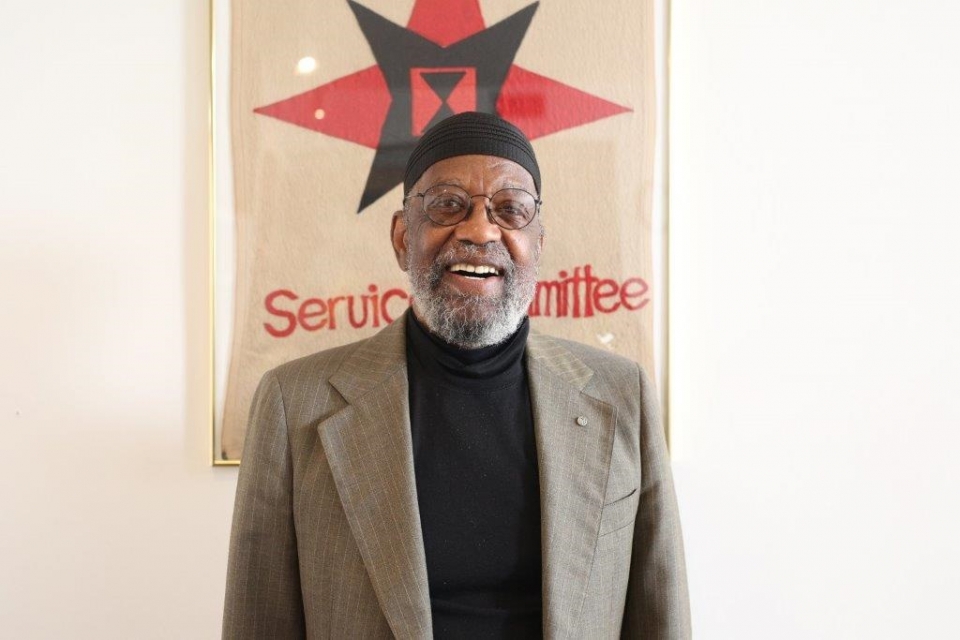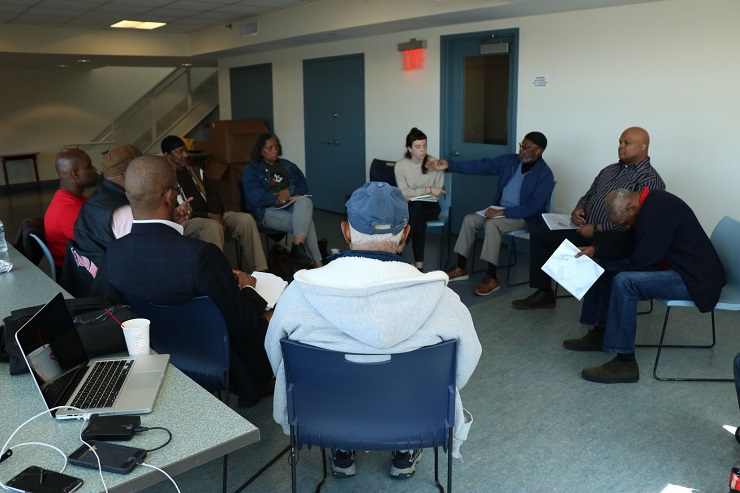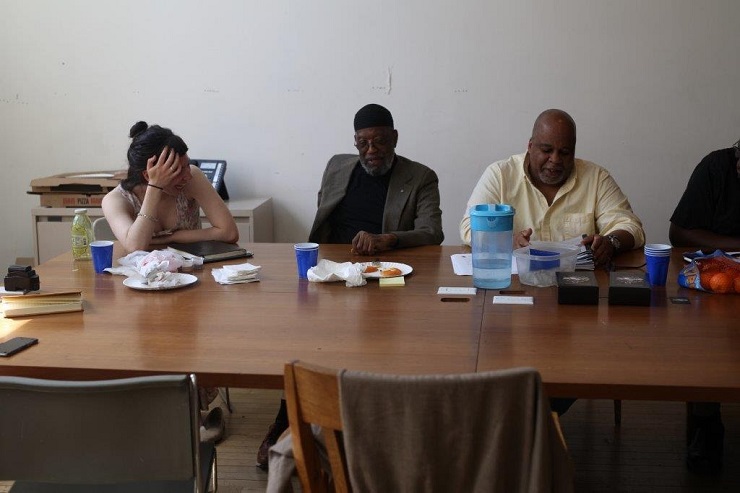
While incarcerated in New York, Larry White began developing a manual to help people serving long-term prison sentences. New York / AFSC
Larry White and Russell Tucker served 32 and 23 years in prison, respectively. They tirelessly seek to reform the criminal justice system. Larry is the founder of Hope Lives for Lifers and a public speaker on prison issues and preventing recidivism. Russell works for Phoenix House, a drug rehabilitation and re-entry program that works on inner reflection and reform. In the first of this two–part interview (part two found here) they share stories from life inside prison and how they’ve found strength, safety, and growth through AFSC.
Christina: How do you push back against the oppressive systems against you, especially being a part of this program?
Larry: The majority of people in the New York state prison system come from disadvantaged communities in large urban areas like New York City, Syracuse – mostly where people of color live. Most communities expect the prison system to reform them and send them back to uplift and develop their communities as changed individuals. The problem is the bulk of the people who are released into the communities violate and go back. There are conversations today regarding the prison system being broken and not working, and there are people like Michelle Alexander author of "The New Jim Crow," to showcase just that.
There are a lot of people who were involved in criminal justice reform in their communities before they got arrested and continue their work in prison to try and change the system. When I was in prison, the first thing I did was organize the prisoners to write to community organizations and invite them to come into the prison to see what was going on. When we came out [of prison], we connected with community organizations, re-entry organizations and social justice organizations like AFSC. We told them what kind of changes that need to be brought into the prison system and we worked with them to bring about these changes.
Working with [AFSC staffer] Lewis Webb's Healing Justice initiative, we developed programs that should be taught in prisons but weren't. I brought out a program that prisoners could develop but nobody else would get involved with it except the AFSC. They [AFSC] went to the prison, talked to the commissioner and he loved the [Hope Lives for Lifers] program. Hope Lives for Lifers, provides opportunities for people who are serving long-term sentences, particularly those between 18 and 26 years old, to manage their sentences in a way that leads to a more peaceful and mindful time in prison, with the overarching goal of better access to parole or other forms of release. That's how we got to the position we are now and how we fight the oppressive systems.

Russell: You fight against the oppressive systems against you by being involved. We make connections with other organizations too, we participate in their activities and some of them participate in ours. We are conscious, we pay attention when we see an injustice, but we need more people. Some people are in painful situations and just accept it as the norm, but some of us who are politically conscious and are aware of our community and our needs, we write letters, we campaign, we march, we do whatever we need to do to make those changes, so that people can live a more decent life. It's people like Larry and AFSC who are conscious of the political system and the egregious things and we organize those people and make them aware of their rights and get them involved.
Larry: Tell them about the organization that you work for, Russell.
Russell: I work for Phoenix House, a drug rehab program that has a re-entry section. We also get people in who are users, we stabilize them in rehab, then we re-entry. The re-entry and reintegration part I take from AFSC and Larry. We try to get them housing and get them involved in the politics of the community as well. Re-entry for them is re-integration, to be able to go back into their community and do some healing, not just by having a regular 9-5 job every day, but by taking part in their communities; the activities of their communities, the politics of their communities and the religious aspects of their communities.
Christina: What does safety in the midst of oppression look like, and is it possible?
Larry: We live in a country where people aren’t treated equally and where there are lot of people who don't feel safe in their own bodies. We're told that we live in a democracy, that we can rely on one another and that these things are supposed to apply to everybody. Well, I find certain people don't feel the same kind of safety that the average person who is not subjected to that kind of discrimination feels.
When I went to prison, the first thing that struck me was that people of color (POC) were the majority in the prison system when in the streets we're a minority. I knew a great deal of people from my same community in prison. How did we get here? that was one of the basic questions that we used to talk about when we got together in the yard. Why are there so many of us in here? You begin to question, why am I a criminal? In prison you have the opportunity to educate yourself and to read and that's what I began to do.

I remember reading a book by this man, Paulo Freire, he's an educator from Brazil who educates disadvantaged people. In reading his books, I began to understand what it means to be alive in this world. That I am one thing and the world is another. I interact with the world and the world interacts with me. Just like this room, there's only so much I can do in this room because of the shape of the room and what's in the room. When I apply that to this community and look at all the constitutions in society: the schools, the social institutions, the economic institutions, recreations, I begin to realize that a lot of the things that I did were also dictated by the conditions within my community. I would think to myself, how do I overcome the disadvantage I see? And, in my self-evaluation see how I used crime to do that.
Growing up, I came from a very poor neighborhood; abject poverty. My mother died soon after I was born so my grandmother raised us. We were on welfare, and I used to go with my grandmother downtown to the welfare place to get food and clothing. Before we left our community, I thought my community was the whole world, I'd never seen or been outside of it. When I went with my grandmother we went through different communities, I saw different people, I saw kids my age who had on different clothes and had different toys. I thought, what's all of this? I want some of that. And then I began to notice that my grandmother - she was a very jolly person - I would notice when we passed the different neighborhoods and the different people, I could feel a kind of tension coming from her, she didn't feel comfortable. I began to understand what my mother used to go through when she went down there.
I was a young kid, maybe nine or 10 years old. I didn't know what poverty was, I didn't know that I was poor. I didn't know that the difference I saw between myself and those people was poverty. I remember I used to come back home and my older sister would tell me we're in poverty, we're poor, that that’s why we don’t have all those things. I would notice how people from those communities would address the same problems. It was that difference that I recognized between me in my community and others in theirs that outraged me. “They have all of this and I don't have it? That’s not how it's going down. I'll get mine one way or another, I don't care how.” And that's what led me to crime. So now we fight against those things, against discrimination, we try to make sure that everybody has an equal shot within this society by changing the system, even when you find you're facing a whole ocean of problems.
Russell: Larry and I were in maximum-security prisons in upstate New York where a majority of the police officers were from and they have a different culture than we do. We came from the city and had different ideas about everything in general, but they were in control, they had the sticks and the guns. We lived with prisoners who had 200 years or more life sentences and so they didn't really care. Not only did we have to worry about the officers who were in control, but we also had to worry about being in that environment, getting stabbed or cut without necessarily having to be involved in the situation. There were so many different gangs inside, you had to walk a thin line.
To survive, you had to be aware and always conscious of your surroundings. Most of us went to school and we participated in these classes trying to better ourselves, which kept us out of the big fights in the yard. Inside, we created our own little environment where we could get together as positive people and continue our growth.
Read more about how communities have taken steps to create Sanctuary Spaces here.
Related posts
Sanctuary Spaces: An introduction
Sanctuary Spaces: A place for healing from incarceration - part 1
Sanctuary Spaces: A place for healing from incarceration – part 2
Sanctuary Spaces: Pushing back oppressive systems from the inside out - part 2
A Sanctuary atmosphere: creating safe, emotional and mental space for people in solitary